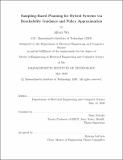Sampling-based planning for hybrid systems via reachability guidance and policy approximation
Author(s)
Wu, Albert.
Download1193032015-MIT.pdf (12.78Mb)
Other Contributors
Massachusetts Institute of Technology. Department of Electrical Engineering and Computer Science.
Advisor
Russ Tedrake.
Terms of use
Metadata
Show full item recordAbstract
Hybrid systems arise in many robotic problems such as manipulation and locomotion, and efficient motion planning is critical for obtaining practical implementations of these systems. However, due to the complexity associated with multiple contact modes, existing motion planning techniques have limited success with hybrid systems. This thesis investigates the entire sampling-based motion planning stack with an emphasis on hybrid system applications. First, a reachability-based variant of the rapidly-exploring random tree algorithm (RRT) named R3T is introduced. R3T is suitable for planning in nonlinear and hybrid systems. It is probabilistically complete in kinodynamic systems and asymptotically optimal through rewiring. The advantages of R3T are demonstrated with case studies on nonlinear and contact-rich robotic systems. Efficient mathematical tools for solving the "nearest-polytope problem", as motivated by control application including R3T, are then discussed. The tools demonstrated logarithmic empirical complexity with respect to the dataset size in examples motivated by approximate explicit model predictive control and R3T. Finally, a novel framework for generating robot manipulation policies is proposed. In this framework, a formulation of RRT* for manipulation first explores the state space and discover plans to a given goal state. A neural network then learns a manipulation policy from the RRT* plans. The manipulation plans from RRT* are verified via playback in simulation, and training results of the neural network suggests the validity of this approach. The goal of this thesis is to provide algorithmic frameworks for developing applications requiring hybrid system motion planning.
Description
Thesis: M. Eng., Massachusetts Institute of Technology, Department of Electrical Engineering and Computer Science, May, 2020 Cataloged from the official PDF of thesis. Includes bibliographical references (pages 77-81).
Date issued
2020Department
Massachusetts Institute of Technology. Department of Electrical Engineering and Computer SciencePublisher
Massachusetts Institute of Technology
Keywords
Electrical Engineering and Computer Science.